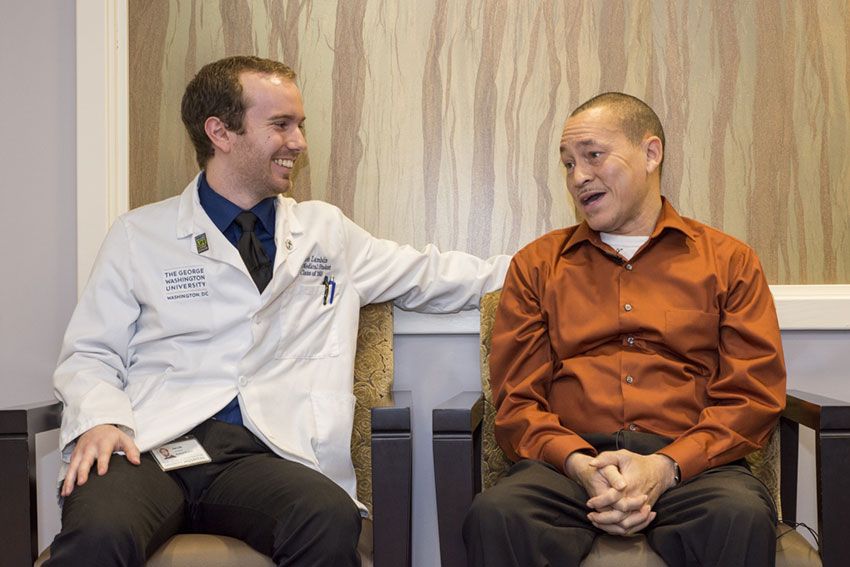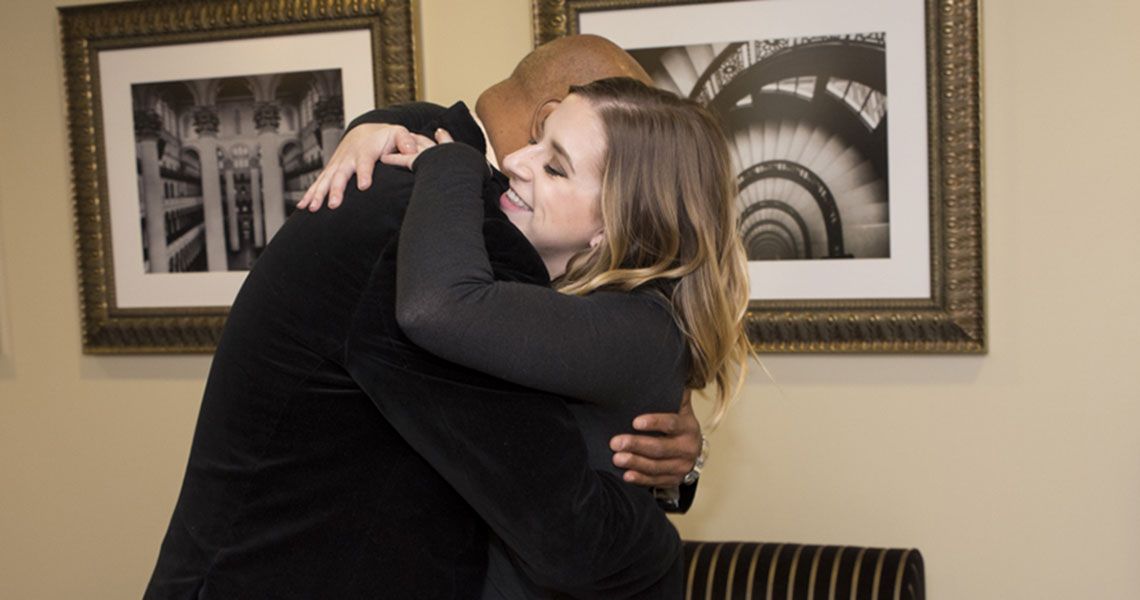Four years ago, Jose Reyes found out he had stage four kidney disease. He was put on transplant lists in Washington, D.C. and in Maryland, but as he started dialysis, his health was deteriorating. For nearly nine months, he waited.
“I know people who have been going to dialysis for a long time, for years. There’s always a hope, but it’s not a realistic hope,” Mr. Reyes said. “You are always hoping for a phone call, but it doesn’t happen that often I imagine.”
Then one day in November, Mr. Reyes’ phone rang. It was a call from the GW Transplant Institute bringing good news—he had been matched with a live donor who was ready to donate a kidney.
On Dec. 20, he received a new kidney and a new lease on life. His new organ came from Sarah Miknis, a photographer at the George Washington University School of Medicine and Health Sciences who was inspired after attending Ron and Joy Paul Kidney Center events and learning more about donation.
Typical patients have two kidneys, but even people with active lifestyles only need one to survive. Despite this, the number of live kidney donors is low.
Kidney Disease is the ninth leading cause of death in the United States and kills more people annually than prostate and breast cancer. Donations can save lives, but 13 people die each day waiting for a kidney transplant, according to the National Kidney Foundation. Washington, D.C., has the highest rate of kidney disease in the United States.
Mr. Reyes said if people understood more about organ donation, more patients would live longer and fuller lives.
“If they could hear the person’s story that’s sick, I think many more would say ‘you know what why not. If I don’t need two kidneys and can live my life healthy, why can’t I help someone live,’” he said.
Mr. Reyes has been recovering well from his surgery. He met Ms. Miknis on Jan. 6, along with another donor and recipient pair with GW ties. He will remember that day forever, he said.
“She is just a special person,” he said. “I remember saying she was an angel who dropped down and blessed me.”
Ms. Miknis was approved to become a donor in May and was matched with Mr. Reyes in November. She took two weeks off work in December for the surgery and recovered quickly, she said.
“It’s not as hard as you think it is to help someone in a really impactful way,” she said, and hopes her story inspires others to become donors.
Mr. Reyes is working on becoming certified to sterilize medical tools used in surgery. He hopes to work in a hospital someday. He also looks forward to having more time to spend with his fiancé and three children.

Andrew Lewis was put on GW’s transplant list in 2015 and waited 11 months before he found a donor match. Mr. Lewis’ condition had worsened and a doctor recommended he start dialysis. When he notified the GW Transplant Institute of his plans, they told him to hold off—they might have found him a kidney.
Less than two weeks later on Dec. 19, Mr. Lewis had surgery and received a kidney from Jacob Lambdin, a third-year medical student at GW’s School of Medicine and Health Sciences. Mr. Lambdin made a commitment to donate a kidney last summer and went through testing in the fall. He wanted to have the surgery on his first day of winter break so he had ample time to recover before heading back to classes.
Mr. Lambdin said it was a simple decision to donate a kidney.
“It is a relatively minor inconvenience, and it has the potential to save someone’s life or prolong someone’s life by many years,” he said. “It sounds intimidating, it sounds like a huge ordeal, but the process is straightforward.”
Mr. Lambdin and Mr. Lewis met on Jan. 6, and neither knew exactly what to say.
“To meet somebody that saves your life is so gratifying, it’s just awesome. I was excited. I wanted the opportunity to tell him ‘thank you,’” Mr. Lewis said. “There’s not a lot of folks who would just do that, it was such a selfless act, and I admire that.”
Mr. Lewis said that after almost a decade of kidney problems, he is committed to a strict diet and health regime to keep his new kidney in peak condition. To celebrate his birthday in March, he plans to indulge with chicken wings and a non-alcoholic beer.
“All things in moderation,” he said.
The two men will always share a bond, Mr. Lambdin said. He hopes his story encourages others to commit to being donors as well.
“It’s always easy to come up with reasons not to do things,” he said. “Ultimately, it comes down to donating is a good thing to do, and I don’t think it’s more complicated than that.”



